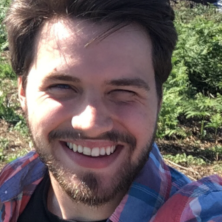What Great Minds Can Do: Garrett Pruzinsky

Could you describe your senior Honors' project?
I examined the Byzantine Empire during the period of Justinian and his reconquest
of the last Roman Empire. When learning about this event, I became also very interested
in Belisarius, who was the Byzantine general who accepted a position from the enemy
side to become the new King of Italy. It was a trick to win the war, and he planned
on handing over the empire to the Byzantine emperor Justinian immediately. It was
following the acceptance of the position when the relationship between Justinian and
Belisarius started to deteriorate, because Justinian became very distrustful of Belisarius
in the moment when he gained some authority. My project examined how the trust between
the two leaders broke down over a two-year period.
What made you interested in this subject?
I've always been fascinated by the Roman Empire, even as a kid. It's been my favorite
time in history to learn about, so I wanted to look at some aspect of the Roman Empire
for my project. But after speaking with my advisor Dr. Wangerin, I realized the Byzantine
Empire also piqued my interest, and I didn't know much about it at all. So, I thought
I'd look deeper and see what I could find out.
Could you describe your research process?
I've found a lot of my sources through the Seton Hall Library and the library's website.
It's been helpful in locating secondary sources, which I can then use to find the
primary sources those authors used, and then I'll go read those and examine them.
There are a lot of sources from the time, but their views are very biased so I have
to sift through a lot of that information when I'm writing it. Also, a lot of the
people who wrote the sources that I'm looking into were part of the upper class, and
had political sway, so that’s an important consideration. Sometimes their writings
might not necessarily be true, like a piece of propaganda to make themselves look
a certain way.
How do you judge the accuracy of your sources in those circumstances?
If I find an example that pops up in a few different places, or in different histories
of the same event or time period, I know that there's a good chance that it probably
happened. But I still have to consider all the reasons why it may have been written.
What has been your favorite history course so far?
I took a class on Vikings with Dr. Wangerin and I really liked it. It was interesting
to learn about all the raids and how far they were able to spread out.
Career Highlights:
- Member, Sociology Club
- Volunteer, DOVE
- USSF Soccer Referee
